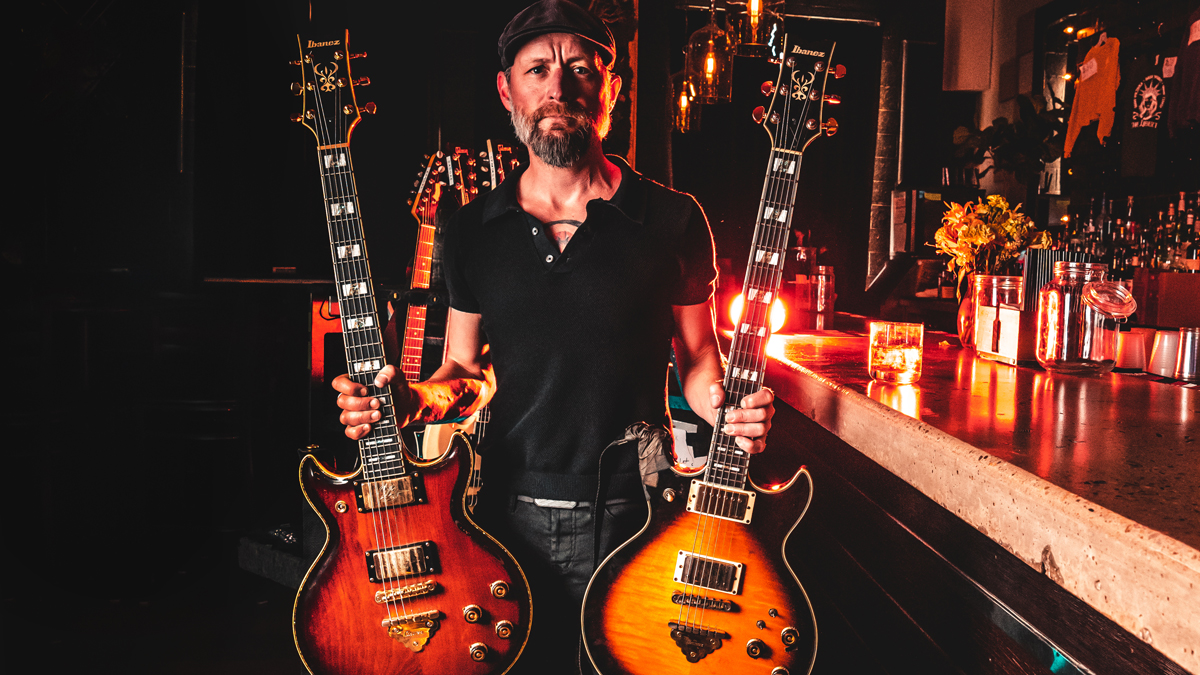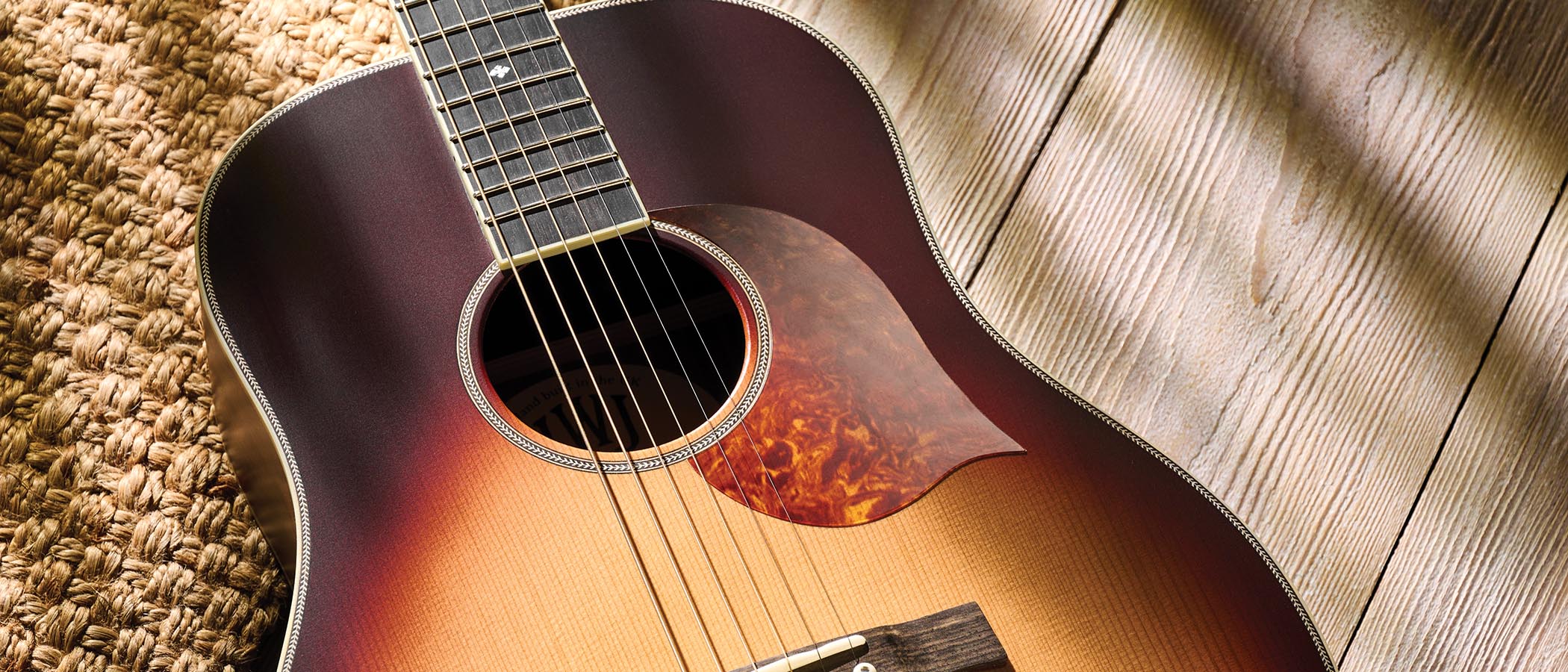Mark Engles: "We wanted the sound to evolve, but you’ve got to keep those roots. It’s still big and heavy… we still love that"
The Black Map and Dredg guitarist on his tonal predilections, switching from Teles to Ibanez Artists and SGs, and the slide tricks he learned from David Gilmour

All the latest guitar news, interviews, lessons, reviews, deals and more, direct to your inbox!
You are now subscribed
Your newsletter sign-up was successful
San Francisco’s Black Map are coasting along the American highway system between Oklahoma and Texas when Guitar World reaches guitarist Mark Engles on his cell phone.
It’s technically a day off from the trio’s current 10th anniversary tour, but Engles quickly notes that the strict scheduling of the trip means sightseeing’s off the menu – they’ll mostly “appreciate the beauty” of the landscape from behind the windshield of the band van.
Later, they’ll try to hit an Applebee’s for some food and hopefully some Golden State Warriors basketball highlights on a big screen, though their home team’s record has been abysmal since the group took off mid-March. Judging by the crowds of raised horns saluting Black Map in a series of recent Instagram posts, the spring’s been more fruitful for the band.
Black Map’s new Melodoria – their first full-length in five years – is a darkly melodic triumph that places them shoulder-to-shoulder with recent post-hardcore crushes from the likes of Failure or Quicksand.
Take the way Engles’ ethereal, stacked-fifth strumming on Super Deluxe caresses the air-pushing kick work of drummer Chris Robyn, at least before the guitarist rips into a raw-and-riffy ascending crunch.
When it comes to the echo-plated bends Engles brings to Left for Dead, though, he admits his esoteric leadwork follows long-time influences like Alex Lifeson and David Gilmour (“I’m not going to shred like them, [but] I’m going to feel out the mood of it”).
Speaking with Guitar World, Engles further weighed in the in-the-flesh heaviness of a power trio, pop world-massive key changes, the future of his other longtime project, dredg.
All the latest guitar news, interviews, lessons, reviews, deals and more, direct to your inbox!
When you’d last spoken with Guitar World around dredg’s last album [2011’s Chuckles and Mr. Squeezy], you were all-in on Telecasters, but looking at recent tour photos you’ve since pivoted towards SGs – there’s that pearl white one in the Super Deluxe video and a cherry-stain finish in your collection, too. When did you make that switch, and was that to differentiate your tone in Black Map from what you’d done with dredg?
“Absolutely, though I still love Telecasters. I’ve been using Ibanez Artists and Gibson SGs, [and] it was definitely a tone thing. When we started Black Map, I wanted to do more down-tuned [songs] – in C or drop D – and I wanted humbuckers, P-90s, because I wanted more crunch.
“We wanted to do Black Map as a more riff-oriented project, so Ibanez Artists and SGs are good for that. They’re not as bright and mid-range-y as the Teles. I did use Teles on the new album, though, on some of the mellower, melodic tunes like Madness and Super Deluxe.”
With the chorus to Super Deluxe in mind, and other spots like the record’s Chasms, it feels like you love a good stacked fifth.
“I always love to use the power chord as the basis, and use my pinky to move around and add all sorts of different notes; that’s just very natural to me. [Bassist Ben Flanagan and I] both do that. He’s a guitar player as well, so when we’re writing we’re always looking for options to move around on.”

Since you mentioned wanting to be riff-heavy with Black Map, can you speak to following those wide open choruses, like on Super Deluxe, with a super-nasty, ascending chunk?
“That’s just good old dynamics, right? I do think Melodoria is less riff-oriented than the first Black Map album [2014’s …And We Explode], though. We wanted the sound to evolve – it’s been eight years since we released our first EP, Driver – [but] you’ve got to keep those roots of why we started the band to begin with. It’s still big and heavy… we still love that.”
I’m hoping we can get into some custom gear of yours—in particular those Tortex Black Map/Steph Curry picks.
“Dunlop has been amazing with hooking us up with picks, strings, and pedals. That’s Ben Flanagan’s [custom] pick; I just have a Black Map logo on mine. We’re big Warriors fans, since we’re from the Bay Area, so that’s why Ben went with the Steph Curry [design].”
Huge thanks to @jimdunlopusa for hooking us up with a boatload of these custom picks for tour! Love em! #tortex #dunloppicks @StephenCurry30 #stephcurry @warriors #blackmap #blackmapmusic pic.twitter.com/PQ1vGan5KJFebruary 17, 2022
You see Bay Area musicians like E-40 at Warriors games; James and Kirk from Metallica have done the national anthem at playoff games, too. Would Black Map be willing to entertain a Warriors crowd?
“We would do that in a heartbeat [laughs].”
While Steph Curry’s famous for three-pointers, Black Map are well-known as a three-piece. Though there are certainly layered moments to your playing on this record, sometimes it’s nice to just feel the real-time spaciousness of a three-piece setup.
“We really enjoy the idea that what you hear on the record is what you’re going to hear live. Of course there are some accoutrements on the record, but we’re not a band that’s going to be throwing on backing tracks live. We take pride in that.”
There’s moments like on Capture the Flag, for instance, where you all lock into a syncopated power-blues kind of run before you, yourself, splinter off into some sci-fi phaser lines.
“That’s the fun part. You can have a high guitar part in the verse, where the bass is dirty on the low end, and then when we do decide to link up, it’s like, holy shit… you can get to another level, right? We can be in different worlds, if you will, and then when we decide to meet up it’s just that much bigger.”
Is there some ambient slide work on Witching Hour?
“Yes! One of the tricks I love to do – I stole it from David Gilmour [laughs] – is you take a metal slide and some sandpaper, and you sand it so the grooves on the slide are parallel with the strings. Then you can throw it up on the frets perpendicularly, you catch me? When you’re actually using the slide up on the fretboard, any note you go to, perpendicular to the string, you’ll get this haunting sound – especially if you use delays and reverbs with it.
“On Pink Floyd’s Live at Pompeii, that [concert film] from 1972, he does it in Echoes and A Saucerful of Secrets. Its just an awesome accoutrement you can add to almost any tune. That was an afterthought [on Witching Hour]. Sometime I’ll wake up in the middle in the middle of the night thinking, 'This tune needs one more notch of atmosphere.'”
I feel like a really underrated, and even besmirched writing trick is the really optimistic, closing key change, which happens in a big way on Madness.
“Ben’s wife, Heidi, was a music major, and she helped him get from a D Major to an E Major in an unconventional way [out of] the breakdown – which is a drone-y bridge. I don’t think we’d done a modulation like that in this band yet; we were stoked to do it in a non-cheesy way. We’ve heard so many big pop songs do it, and sometimes its just so forced. We were stoked it came out naturally.”
You’re playing shorter, acoustic VIP sets throughout this current tour. Has stripping the new songs down for these bonus sets changed the overall feel of the tunes?
“It always does… [but] we always say to each other that it’s a really good test to break any song down acoustically.
“Sometimes you have to massage them, whether it’s a key change or adding a capo. We’ll kind of look at each other like, 'That one’s gonna work,' or 'that one needs to be massaged some more.'
“For instance, we’re doing Super Deluxe acoustically. When that post-chorus riff comes in – that chunky part – it’s not the easiest thing to do [with] an acoustic guitar[‘s action], but it’s also an amazing warmup for a show. You’re doing that riff on an acoustic an hour before the set and it’s like, 'Great! I’m warmed up!'”
Outside of Black Map, both [dredg guitarist-vocalist] Gavin [Hayes] and yourself have mentioned that you’ve been working on new dredg songs in the studio. How’s the future of dredg looking?
“It’s very simple: we’re very much alive. Right now, my main focus is on [Melodoria] – I’m enjoying being on the road with Black Map; it’s been incredible – but dredg is very much alive. I have two bands.
“We don’t have a timeline yet, but we have new material. We have a book/memoir boxset coming out eventually, too, but there will be a new dredg record. That’s for sure.”
- Melodoria is out now via Minus Head.
Gregory Adams is a Vancouver-based arts reporter. From metal legends to emerging pop icons to the best of the basement circuit, he’s interviewed musicians across countless genres for nearly two decades, most recently with Guitar World, Bass Player, Revolver, and more – as well as through his independent newsletter, Gut Feeling. This all still blows his mind. He’s a guitar player, generally bouncing hardcore riffs off his ’52 Tele reissue and a dinged-up SG.

